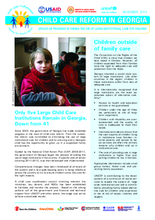Since 2005, the government of Georgia has made incredible progress in the area of child care reform. Guided by the National Child Action Plan (CAP) 2008-2011, the government of Georgia began the process of ending the use of large institutions in the country. A specific plan of action covering 2011-2012, was further developed and implemented. Gatekeeping policies were introduced nation-wide and a child care coordination council involving relevant line ministries, NGOs and key donors has been established to facilitate and monitor the process.
The key objectives of the child care reform were to:
- Systematically close all large scale institutions
- Reunify children from closed institutions with their families when in the child’s best interest and with sustained family support
- Develop and strengthen family based alternatives such as foster care and small group homes for those children who cannot be reunited safely with their family
- Expand the quality of social workers in the country to manage the individual cases, and establish a supervision system for social workers
- Reform child care policies, legislation and funding flows to support the new child care system
As a result of this child care reform, the country witnessed a dramatic change in the way government delivers child care services. Foster care is now the dominant form of alternative care in the country and Small Group Homes are the last resort for children who cannot be with their families or for whom a foster care family is not possible. The number of trained social workers has increased by 25% in the past two years to 250 trained state social workers. Day care centers, early intervention services for families caring for children with disabilities, and small group homes are run by NGOs. Furthermore, the reform has been complemented by a strong advocacy and public awareness campaign. The number and quality of social workers are growing as well as new social work trainings have launched to aim at effectiveness. Most importantly, the number of children living in large institutional care has been reduced from 4000 to 250. During 2011-2012, 23 of the remaining 28 institutions were closed. In the past 12 months, about 33 percent of all children from institutions have been reunited with their families. The government has also introduced a reunification package as well as provided access to health insurance and free daycare for children.
©Ministry of Labor, Health, and Social Affairs of Georgia and USAID

